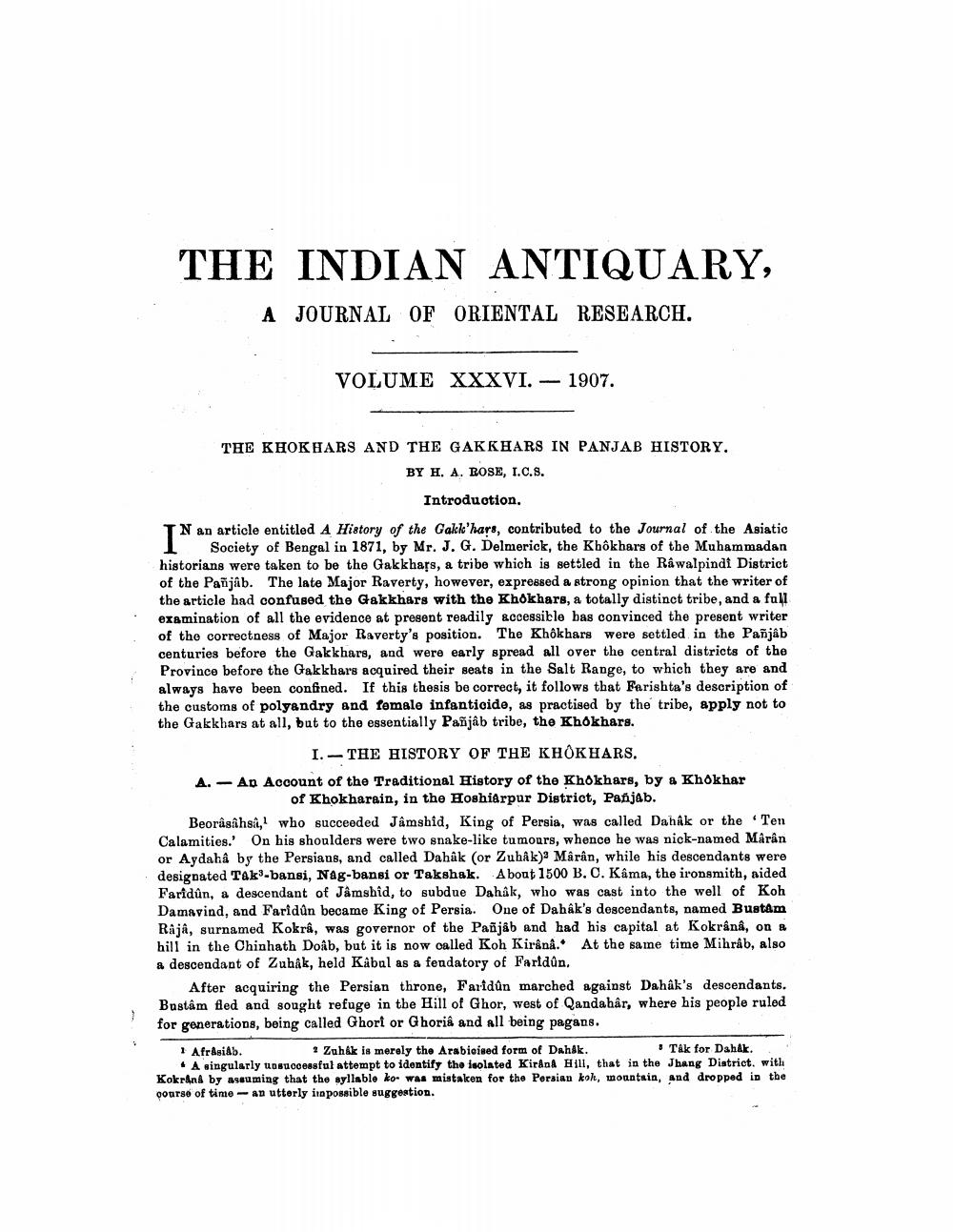Book Title: Indian Antiquary Vol 36 Author(s): Richard Carnac Temple Publisher: Swati Publications View full book textPage 5
________________ THE INDIAN ANTIQUARY, A JOURNAL OF ORIENTAL RESEARCH. VOLUME XXXVI. — 1907. THE KHOKHARS AND THE GAKKHARS IN PANJAB HISTORY. BY H. A. ROSE, I.C.S. Introduction. TN an article entitled A History of the Gakk'hars, contributed to the Journal of the Asiatic 1 Society of Bengal in 1871, by Mr. J. G. Delmerick, the Khokhars of the Muhammadan historians were taken to be the Gakkhars, a tribe which is settled in the Rawalpindi District of the Pañjab. The late Major Raverty, however, expressed a strong opinion that the writer of the article had confused the Gakkhars with the Khokhars, a totally distinct tribe, and a full examination of all the evidence at present readily accessible has convinced the present writer of the correctness of Major Raverty's position. The Khôkhars were settled in the Pañjab centuries before the Gakkhars, and were early spread all over the central districts of the Province before the Gakkhars acquired their seats in the Salt Range, to which they are and always have been confined. If this thesis be correct, it follows that Farishta's description of the customs of polyandry and female infanticide, as practised by the tribe, apply not to the Gakkbars at all, but to the essentially Pañjâb tribe, the Khokhars. I.-THE HISTORY OF THE KHOKHARS. A. -An Account of the Traditional History of the Khokhars, by a Khokhar of Khokharain, in the Hoshiarpur District, Panjab. Beorâsîhsî, who succeeded Jamshid, King of Persia, was called Dahák or the Ten Calamities.' On his shoulders were two snake-like tumours, whence he was nick-named Mârân or Aydaha by the Persians, and called Dahak (or Zubảk)a Mârân, while his descendants were designated Tak-bansi, Nag-bansi or Takshak. About 1500 B. O. Kama, the ironsmith, aided Faridůn, a descendant of Jamshid, to subdue Dahák, who was cast into the well of Koh Damavind, and Faridůn became King of Persia. One of Dahâk's descendants, named Bustam Râjâ, surnamed Kokra, was governor of the Pañjab and had his capital at Kokrânâ, on a hill in the Chinhath Doab, but it is now called Koh Kirânâ. At the same time Mihrab, also a descendant of Zubak, held Kabal as a fendatory of Faridan. After acquiring the Persian throne, Faridûn marched against Dahâk's descendants. Bustâm fled and sought refuge in the Hill of Ghor, west of Qandahår, where his people ruled for generations, being called Ghort or Ghoriâ and all being pagans. 1 AfrAsiab. ? ZuhAk is merely the Arabicised form of Dahak. Tak for DahAk. • A singularly to Buccessful attempt to identify the isolated Kiránd Hill, that in the Jhang District. with Kokrana by assuming that the syllablo ko. was mistaken for the Persian koh, mountain, and dropped in the Qourse of time an utterly is possible suggestion.Page Navigation
1 ... 3 4 5 6 7 8 9 10 11 12 13 14 15 16 17 18 19 20 21 22 23 24 25 26 27 28 29 30 31 32 33 34 35 36 37 38 39 40 41 42 43 44 45 46 47 48 49 50 51 52 ... 430
